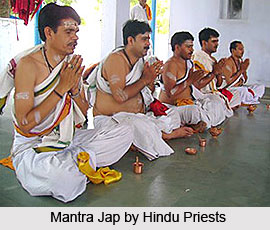 Mantra in Hinduism is a sacred utterance which is considered to possess mystical or spiritual value. It is a hymn of invocation or form of prayer in the Sanskrit language. Mantras are used in the performance of every religious rite and spiritual practices to express devotion, establish communication or fulfil desires. They are beneficent or hurtful, salutary or pernicious. Mantras have traditionally been used in both ritual and spiritual practices and worldly activities for various ends. The spiritual value of mantra comes when it is audible, visible, or present in thought.
Mantra in Hinduism is a sacred utterance which is considered to possess mystical or spiritual value. It is a hymn of invocation or form of prayer in the Sanskrit language. Mantras are used in the performance of every religious rite and spiritual practices to express devotion, establish communication or fulfil desires. They are beneficent or hurtful, salutary or pernicious. Mantras have traditionally been used in both ritual and spiritual practices and worldly activities for various ends. The spiritual value of mantra comes when it is audible, visible, or present in thought.
Mantras are either spoken aloud or merely sounded internally in one"s thoughts, and they are repeated continuously for some time. All the mantras are meaningful and have a profound underlying significance that is in effect distillations of spiritual wisdom. Thus, repetition of or meditation on a particular mantra can induce a trancelike state in the participant and can lead him to a higher level of spiritual awareness.
Significance of Mantra
Mantras are chanted in religious ceremonies to accumulate wealth, avoid danger, or eliminate enemies. They are recited for casting out evil spirits, some for inspiring love or hatred, for curing diseases or bringing them on, for causing death or averting it.
The priest in the ceremonies recites the mantras according to the occasions. Mantras are presumed to be effectual as vibration, to the effect that great emphasis is put on correct pronunciation. They are intended to divert the mind from illusion and material inclinations. Besides bringing spiritual enlightenment, different kinds of mantras are used to work other psychic or spiritual purposes, such as protecting oneself from evil psychic powers. One of the most powerful and widely used mantras in Hinduism is the sacred "Om Mantra".
Types of Mantra
Depending upon their use and purpose, mantras can be classified into various categories. Their use varies according to the school and philosophy of Hinduism associated with the mantra. Some of the popular Mantras are like the Maha Mrityunjaya Mantra, Ganesha Mantra, Gayatri Mantra, Maha Kali Mantra, Maha Laxmi Mantra and many more.
Thus, Mantras continue to be an important feature of Hindu religious rites and domestic ceremonies. Mantras are an important aspect of Hinduism.




















